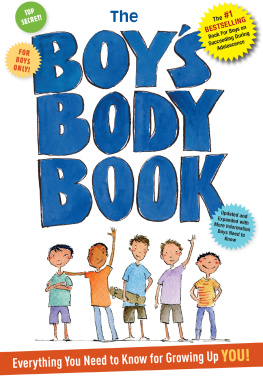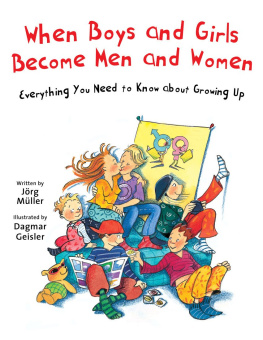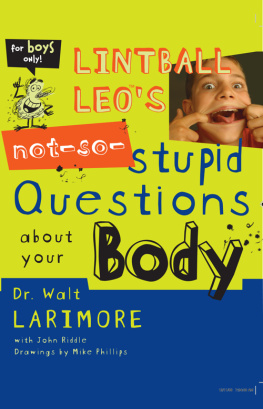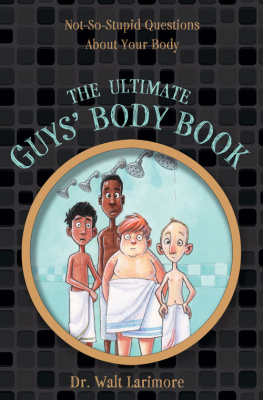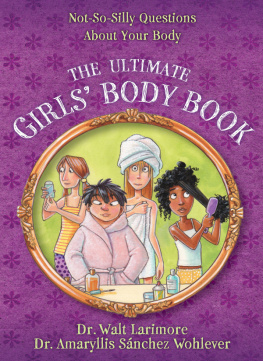TABLE OF CONTENTS
Whats Changing?
Your Changing Body
The Care and Feeding of Your Changing Body
Your Health and Your Body
Your Changing Body in the Outside World
Changes at Home
Your Changing Feelings and Friends
Staying Safe in the Real and Virtual Worlds
Stressful Situations
Dedicated to Heather Ann MacAllister, who every day makes the world a happier and safer place to be a growing boy.
-K.D.
Introduction:
WHATS CHANGING?
AT THIS TIME in your life, on some days it might seem like... everything!
Your body is changing.
Your feelings are changing.
Your relationships with your friends and family members are changing.
It hardly seems fair, does it?
Especially because often as a boy gets older, he finds that it gets more difficult to talk with the adults in his life about the kind of things he used to. There are a few very good reasons for this:
He might be afraid to ask a question he thinks he should already know the answer to.
He might feel like he doesnt know the best (or the most polite) word to use to describe something that is happening with his body.
He might be worried that something he is feeling isnt normal, and that people would laugh at him if they knew what was going on in his head (or his body!).
Not very fun, but it is 100% normal!

Books = Food for your Brain
And it isnt just kids who sometimes develop troubles communicating. You may have noticed that sometimes the adults around you have trouble talking about the changes you are going through.
It seems like they should be able to handle it, since theyve been through this hard kid to adult transition themselves. So what are they worried about? Mostly the same things you are!
They might worry about not having all the right information.
They might remember how awkward this time was for them and feel like they dont have any advice to help you get through it.
They might even be worried (does this sound familiar?) of not knowing the correct or polite terms for body parts and body processes.
And especially, they might be worried about giving you more information than you want to know or are ready for.
So with boys and adults all red-faced and stammering and stuttering it makes it hard for information to flow back and forth. Thats where this book comes in.
Theres no such thing as a stupid question.

This book has a lot of information about the changes that are coming your way. We hope it will answer many of your questions so that you feel more ready and informed and less confused and scared.
Since this is an introduction, well take a few minutes here to introduce the topics to come. First up is a Chapter about puberty covering everything from growth spurts to body hair. In chapter 2, well talk about how to take care of your body now that it is getting all grown up. (Hint: Deodorant is your friend). Chapter 3 goes into more detail about how to take care of yourself, including eating right, working your muscles, and getting enough sleep.

Were moving on to your social life in Chapter 4, talking about grades, study skills, and after-school jobs. Chapter 5 is about the changes you might see at home, such as curfews and changing family relationships. If you want to hear more about friendship skills or how to relate to girls, turn to Chapter 6, where we discover how your feelings and friends might be changing. Chapter 7 is very important. Thats where we talk about keeping yourself safe both on the internet and in the real world. Finally, Chapter 8 is all about common stressful situations, including divorce, moving, and out-of-control feelings.
Oh, almost forgot, at the very end, youll discover some great resources that will be able to go into more depth about topics than we have room for here. Be sure to check them out if we havent answered all your questions or you need more information.
There is no right or wrong way to use this book. You are the expert on how to make it work best for you!
You might want to sit right down and read it from cover to cover all at once (maybe under the covers with a flashlight, if you are feeling particularly shy).
You might just look at the chapters that interest you for now, and then put it on your shelf until you have more questions about the other stuff in the rest of the book.
If you arent interested or dont want to know about the stuff in this book, no problem. You can always put the book away until later when you want to know more!
QUICK TIP

If you dont like to read, (there are probably lots of guys who wish someone would develop an all about your changing body video game) you can ask an adult you trust to read through this book with you. Maybe you can use it as a starting point for a discussion about any questions you have.
This is just one small book so it cant contain the answers for every question that you might have about this excitingbut sometimes confusingtime of your life.
Again, a trusted adult comes in handy. If something written here doesnt make sense to you, or is different from your experience, discuss it with a parent, teacher, health care provider, or another responsible, trusted grown-up.
Although this time is not easy, you already have many resources for dealing with the changes that are coming your way. You have past experiences that you have learned from. You have friends that are going through the same things you are, and you have adults who care about you. All these things will help make the process smoother. Best of luck to you as you begin the important transition of growing from a boy into a man.
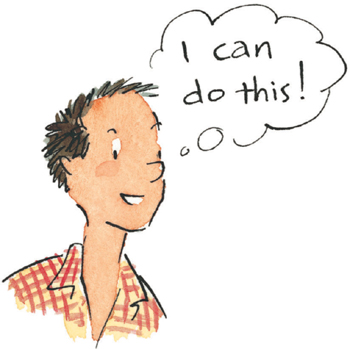

BOYS SAY:
I FOUND IT KIND OF EMBARRASSING TO TALK TO PEOPLE ABOUT MY BODY SO I WAS GLAD THERE WAS A BOOK LIKE THIS ONE. I USED TO KEEP MINE HIDDEN IN MY SOCK DRAWER WHERE NO ONE WOULD LOOK FOR IT.
Danny, age 15
Chapter 1:
YOUR CHANGING BODY (WHAT ON EARTH IS GOING ON AROUND HERE?)
If you are a boy between the ages of 8 and 12, you have probably noticed some changes in your body. These changes are called puberty. Puberty is the general name for the process everyone goes through to change from a kid to an adult. Some of the changes are physical and some of the changes are emotional.
Puberty takes place over several years, and while it may seem like the process will never end, most boys are through puberty by age 16 or 17 or so.

